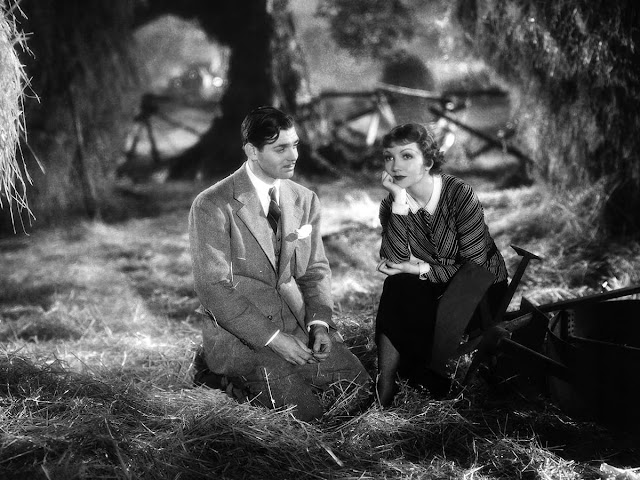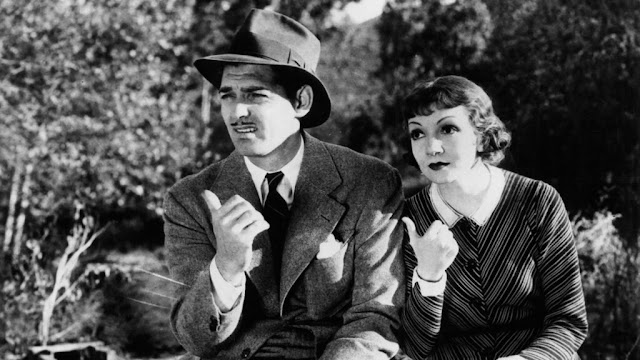Considering how wonderful the final product is it is a bit of a surprise to learn that the production of It Happened One Night was so fraught with complications, not the least of which was dissension amongst the two lead actors. When the original script was shopped around no one wanted to star in it. It was rejected by nearly every A-list actress offered the role with the one major exception being Bette Davis who lobbied for it but couldn’t convince Warner Bros. to loan her out to Columbia to star in it. Clark Gable wanted nothing to do with it and was forced into it as punishment for refusing a role in his home studio, MGM. He refuted that claim in later years but, regardless of whom is being honest about how he got put in the role, Frank Capra, the director, insisted he was reluctant to appear in it. Claudette Colbert also wanted nothing to do with it and complained heavily about the script which pushed Capra into hiring a script doctor to tune it up. Whatever the problems were with it, the final product is simply a joy to watch. Colbert and Gable may have been unhappy on set but there is no denying they had chemistry.
The plot is pretty straight forward. Spoiled heiress Ellie Andrews (Claudette Colbert) has married pilot and fortune hunter King Westley (Jameson Thomas) against her father’s (Walter Connolly) wishes. Mr. Andrews, a very wealthy businessman, wants to have the marriage annulled, knowing Westley is only interested in the money. He confronts her in Florida where she has eloped and tries to have her sequestered, but she jumps ship and runs away, intent on boarding a Greyhound bus to New York City to reunite with her husband.
On board the bus she runs into Peter Warne (Clark Gable), a newspaper reporter who has just lost his job. He recognizes who she is and, realizing there is a story to be had about a spoiled heiress fleeing her father for love, sets out to assist her on her journey to New York, avoiding her father’s detectives, in exchange for the story of a lifetime. Their journey north is fraught with problems. Ellie has her bags stolen, she misses the bus when she is late getting back, she runs out of money, and Peter isn’t the only one along the way that ends up recognizing her. All the while Peter uses his guile and experience to keep her from being caught and sent back to her father. And along the way he begins to fall for her and she for him.
1934 was before the motion picture studios adopted the self censorship model that became the Hays Code, also known as the Breen Code. Before that, movies had more free rein to discuss things like sex and violence. While there is little of violence in It Happened One Nightthere is plenty of risqué moments that would have never been allowed in the cinemas just ten years later. One such moment is a scene where Claudette undresses, preparing for bed, while Gable is just on the other side of the room they are staying in together. It was Claudette’s idea to hang up a rope dividing the room with a sheet separating the two halves. It was also her choice to call it The Walls of Jericho, a biblical reference that would be used again later when the walls came tumbling down.
Even without knowing the production history of It Happened One Night it is obvious this is a rushed production. There is very little in the way of stylized camera work; there simply was not enough time to set up anything like that. A film like this usually commands eight or more weeks to film. One of the stipulations Claudette required to sign on to the film was a maximum of four weeks shooting. This was to accommodate her already scheduled vacation time. Frank Capra knew he would have to forgo the usual style of filmmaking and shoot the bare minimum of coverage to bring the whole thing in on time, especially since Claudette was in nearly every scene. Consequentially there is a slapdash feel to many of the more complicated scenes betraying the short production time. Still, such things add to the film’s charm and simplicity.
Claudette and Gable may have both not wanted to be there on set but you wouldn’t notice it watching them on screen. This is a testament of just how professional both of them were on set. Compare it to Humphrey Bogart in Conflict or The Two Mrs. Carrolls and you can see the difference. Bogart is so obviously not interested in those films and it shows. He was not a bad actor but if he didn’t want to be there his performance showed it. Claudette and Gable may have not liked the situation but that didn’t stop them from enjoying that year’s Academy Awards when both took home statues for this, and rightfully so. Both of them are absolutely convincing in what could have easily been throwaway roles. The only really false note comes from Gable in his introductory scene when he’s trying to play drunk. He plays it too broadly. But this is a minor nitpick in an otherwise pitch perfect performance.
There is nothing particularly surprising in this story. It goes exactly where you would expect it to. But this type of film is not about the final destination but the journey to get there. It’s obvious these two are going to fall in love. This script is good but not good enough to hide that little plot point. It also sucombs to genre clichés such as the two leads starting out hating each other before eventually growing respect, then finally love, for each other. What makes this film so good is that it’s not bogged down by those clichés. It embraces them and then gives us plenty of surprises elsewhere, such as the friendly and boisterous man, played by Alan Hale, who picks them up hitchhiking only to try and drive off and steal their baggage when they stop at a gas station. Gable inexplicably chases him down on foot and roughs him up, stealing his car in the bargain. There is a moment on the bus when a nosy man who has been hitting on Claudette figures out who she is and tries to blackmail her for his silence. How Gable handles that situation is absolutely hilarious.
Frank Capra has crafted a film that manages to elevate what was considered a poor script into a film that would be decorated with the Best Picture of 1934. Whatever retooling was done to the script must have done the trick as it also pulled in a Best Adaptation win. In fact, It Happened One Night was nominated for five Oscars and took home every single one of them. Several of the actresses who had publicly turned down starring in it went on record afterwards stating that what was made was nothing like the script they had read when they declined the part. Whether this was just their way of justifying their actions in the face of the results we’ll likely never know. What we do know is that the final results speak for themselves. Even now, ninety years later, this film is still an absolute delight to watch and the two leads are as charming as they ever were.
Academy Award Nominations:
Outstanding Production: Frank Capra and Harry Cohn (won)
Best Director: Frank Capra (won)
Best Actor: Clark Gable (won)
Best Actress: Claudette Colbert (won)
Best Adaptation: Robert Riskin (won)
____________________________________________________
Release Date: February 22, 1934
Running Time: 105 Minutes
Not Rated
Starring: Clark Gable and Claudette Colbert
Directed By: Frank Capra








Comments
Post a Comment